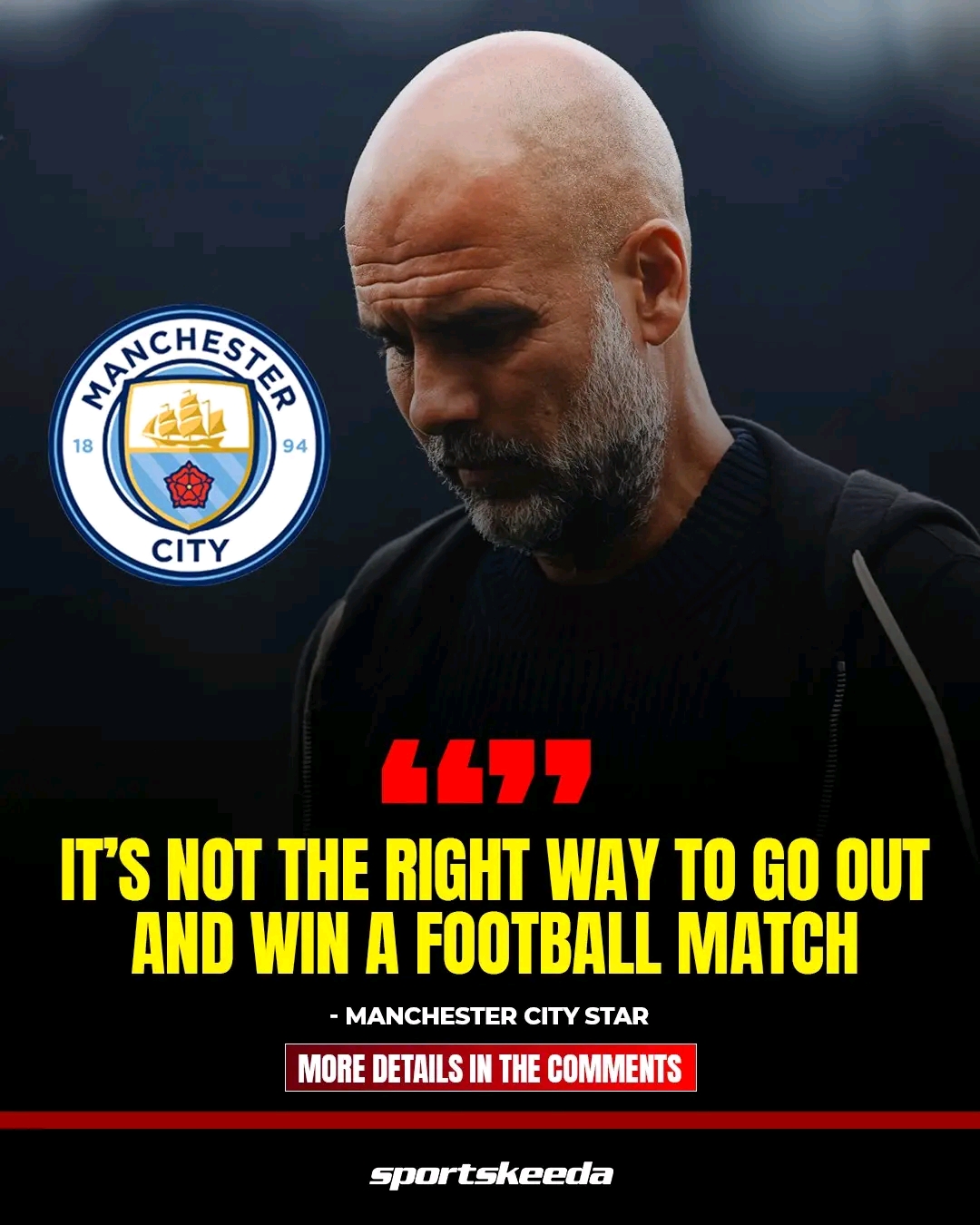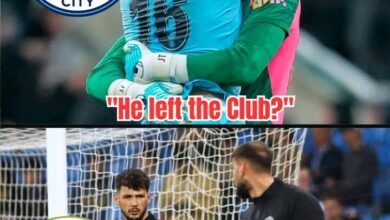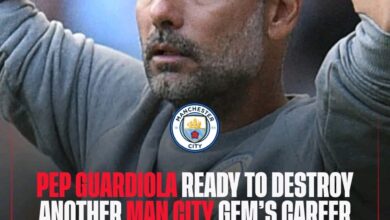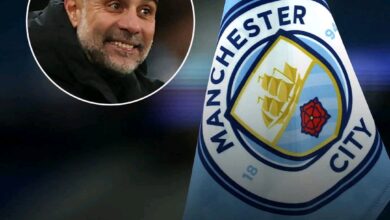Manchester City star slams Guardiola’s defensive strategy against Arsenal

Manchester City’s clash against Arsenal at the Emirates last month has left a lingering sense of shock and unease within the footballing world, and nowhere is this more evident than within the corridors of the Etihad itself. City, a team synonymous with possession football, relentless pressing, and fluid attacking brilliance, suddenly seemed like a shadow of its usual self, retreating into a defensive shell and inviting pressure in a manner few could have predicted. The 1-1 draw, with Erling Haaland giving City an early lead and Gabriel Martinelli salvaging a last-gasp equalizer for the Gunners, has raised serious questions about Pep Guardiola’s tactical choices, and one of the club’s own defenders, John Stones, has now publicly voiced concerns about the strategy.
In a candid discussion with talkSPORT, Stones, who has been part of Guardiola’s Manchester City project for over a decade, revealed that the defensive approach employed against Arsenal was neither premeditated nor representative of City’s philosophy. The central defender, whose career has spanned several eras of City’s transformation from domestic contender to global powerhouse, described the match as a test of patience and endurance, one that challenged the players in unfamiliar ways.
“No, it wasn’t planned, and I think it’s definitely not in our DNA as a team to go out and do that,” Stones explained. “I believe it’s not the right way to go out and win a football match by sitting on the edge of your box. I’ve played against it enough to know how frustrating it is and how difficult it is to soak up all that pressure for a long period of the game.” His words echoed a sentiment that many observers had quietly noted after the game: Manchester City, a club that usually dictates matches with the ball at its feet, had temporarily abandoned its identity in a bid to protect an early lead.
Haaland’s goal in the ninth minute had initially suggested that City could seize control and impose its usual dominance. The Norwegian striker, who has become the symbol of City’s attacking prowess, latched onto a counter-attack and calmly finished to put the visitors ahead. But instead of using that advantage as a platform to assert dominance, City appeared to retreat. Stones highlighted the difficulty of enduring prolonged periods of Arsenal pressure, emphasizing that such a defensive posture was taxing not just physically but mentally.
“It was a mixture of things, definitely, not a tactical kind of set-up from us. More of feeling the game and… I don’t know, it’s a difficult one for me to say,” Stones admitted. This statement is telling. It indicates that Guardiola’s instructions, while clear in intent, may have left the players in a situation that did not align with their instincts or training. A team built to control possession and suffocate opponents found itself repeatedly under siege, forcing players to adapt on the fly, to “feel” the game rather than execute a familiar strategy.
The statistics underline the anomaly. Manchester City ended the game with just 32.8% possession—the lowest in any top-flight league match under Guardiola, according to Opta. To put this into perspective, a Guardiola team with less than one-third possession is almost unthinkable. His philosophy is built on control, on the idea that keeping the ball diminishes the opponent’s threat. To see a City side surrender possession in this manner was, by any measure, extraordinary. Guardiola himself has acknowledged his discomfort with the situation, describing the experience in post-match comments with characteristic frustration and humility.
“I cannot live in this country with another record, you know. I’m so proud of that,” he told reporters, referencing his usual obsession with standards and performance metrics. “We don’t want it, but sometimes it happens. One time in 10 years is not bad, right? I suffer. I don’t like it. I want the ball away, away now.” Guardiola’s admission reveals the tension between the outcome—a point earned at a hostile ground—and the method, which deviated so sharply from City’s ethos that even the manager himself found it unsettling.
Historically, Guardiola’s City sides have dominated games through technical superiority. From the early days of his tenure in England, the team’s identity has been forged around fluidity, positional rotations, and relentless possession football. The matches against Arsenal that now draw attention are anomalies. Even in Guardiola’s previous encounters with the Gunners at the Emirates, City had managed to maintain a semblance of control. The second-lowest possession under Guardiola in a top-flight league match, ironically, was also against Arsenal at the Emirates, with City holding 36.1% yet winning 3-1. The contrast between that performance and the recent 1-1 draw highlights how situational variables, perhaps including injuries, player fatigue, or the psychological impact of facing a high-tempo Arsenal side, can dramatically alter a game plan.
The aftermath of the draw has prompted significant reflection within City’s ranks. John Stones’ comments suggest a desire to return to the principles that have defined City’s success over the past decade. “Looking back at it now, it’s very uncharacteristic of us for how we’ve played over the ten years that I’ve been there, and we got a result out of it. I think next time we definitely have to go there and play our game,” he emphasized. These words underscore the importance of identity in football—a reminder that while results are crucial, the process, the philosophy, and the consistent execution of style are equally vital to long-term success.
City’s position in the Premier League adds weight to the discussion. With 13 points from their first fixtures, they sit fifth in the table, while Arsenal, leaders with 16 points, have looked formidable. The gap, though narrow, reflects the subtle shifts in performance and approach that can define a season. Guardiola’s squad is undoubtedly talented, but matches like the Emirates encounter illustrate how strategic decisions, even from one of the most decorated managers in modern football, can produce unintended consequences.
The Arsenal game also ignites broader questions about footballing psychology. Stones touched on the mental strain of enduring sustained pressure, a scenario few in the Premier League experience for prolonged periods. While City players are highly skilled, the act of defending deep for the majority of a match contrasts sharply with their habitual roles as orchestrators and creators. The cognitive load of constant defensive vigilance, coupled with the anticipation of counters from a lethal Arsenal attack, creates a stress environment that can compromise performance and decision-making. In this context, the goal conceded by Martinelli in injury time is not merely a lapse in focus but a predictable outcome of a prolonged defensive strategy that City’s players are not conditioned to execute regularly.
Guardiola’s tactical choice also raises discussions about modern football trends. Teams sometimes “park the bus” as a defensive expedient, particularly when protecting a narrow lead against superior opponents. However, City’s ethos has always been antithetical to such an approach. By temporarily abandoning possession-based control, Guardiola introduced an element of risk, and the eventual equalizer for Arsenal exemplifies the peril inherent in deviating from foundational principles. In interviews and public statements, Guardiola has acknowledged this tension, balancing pride in the point gained with dissatisfaction at the method.
Beyond the tactical and statistical analysis, the Emirates encounter is significant in its narrative implications. Guardiola’s City has consistently been portrayed as a team that defines matches, rather than reacting to them. Yet in this fixture, the roles were reversed. Arsenal dictated terms, exploited space, and forced City into survival mode. Stones’ commentary reflects the internal dialogue of professionals who value autonomy on the pitch and the ability to impose their style. His critique is measured, acknowledging the necessity of adapting to the game while subtly reinforcing the ideal of proactive football over reactive containment.
The discussion is far from purely academic. Fans, pundits, and analysts have dissected City’s performance extensively, debating whether the defensive stance was a one-off anomaly or indicative of a deeper strategic flexibility. Stones’ perspective adds authenticity to the debate. As someone embedded in Guardiola’s system, his views carry weight, suggesting that even within elite squads, deviations from core philosophy carry costs—both in results and in player comfort and confidence.
Looking forward, the encounter against Arsenal could influence City’s tactical planning for the rest of the season. Matches against top-six opponents, high-press teams, and clubs with fast, incisive attackers may prompt Guardiola to recalibrate. Stones’ remarks hint at a preference for returning to the tried-and-tested approach: assert possession, dictate tempo, and force opponents to react. This philosophy, successful for over a decade, emphasizes that while flexibility is necessary, consistency in style is paramount to achieving the highest standards in modern football.
Moreover, Guardiola’s comments post-match highlight his human side. Even the world’s most celebrated tactical mind experiences frustration when circumstances compel a temporary departure from principles. “I suffer. I don’t like it,” he admitted. This transparency, rare among elite managers, resonates with players and fans alike. It reinforces the idea that football is not merely a game of results but a theater of execution, identity, and philosophy. Guardiola’s discomfort reflects his commitment to the process, not just the scoreboard.
Stones’ articulation of the mental and physical demands of defending for extended periods also invites reflection on player development and conditioning. Modern footballers are expected to be versatile, yet specialization and comfort within a system remain critical. For a team like City, where dominance is expected and possession is a weapon, being forced into prolonged defensive roles tests both stamina and psyche. The late goal conceded serves as a reminder that while tactics can be adapted, they must be reconciled with players’ strengths, instincts, and long-term conditioning.
The broader Premier League context further enriches the narrative. Arsenal, under Mikel Arteta, have emerged as one of the most tactically astute sides, combining youthful energy with technical precision. For City, encounters with such opposition are less about isolated matches and more about maintaining a competitive rhythm in a tightly contested season. Stones’ call for a return to traditional playstyle is as much a message about resilience and identity as it is about tactics: City must continue to be themselves, even when challenged by formidable opponents.
In conclusion, the 1-1 draw at the Emirates serves as a fascinating case study in football management, player psychology, and tactical philosophy. John Stones’ candid reflections offer a rare insider perspective on the difficulties of executing an uncharacteristic strategy and the importance of adherence to a club’s footballing identity. Guardiola’s acknowledgment of discomfort, combined with City’s statistical anomalies, underscores the delicate balance between flexibility and consistency.
The match has left its mark on Manchester City, prompting reflection, debate, and renewed commitment to their principles. Stones’ insistence on returning to their traditional style signals the team’s recognition that while adaptation is necessary in football, success is ultimately rooted in authenticity, identity, and execution. For City fans, the Emirates encounter will be remembered not just for the result but as a reminder of what makes their team exceptional: a commitment to proactive football, relentless possession, and the courage to play their game, no matter the opposition.
As the Premier League season progresses, City’s ability to balance strategic flexibility with philosophical consistency will define their title challenge. Guardiola, Stones, and the entire squad must reconcile the demands of elite competition with the values that have propelled them to the pinnacle of world football. In doing so, they ensure that even moments of adversity, like the Emirates draw, become lessons in resilience, reflection, and the relentless pursuit of excellence.















